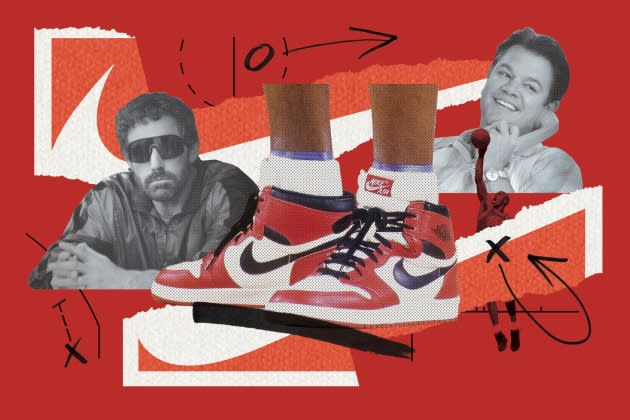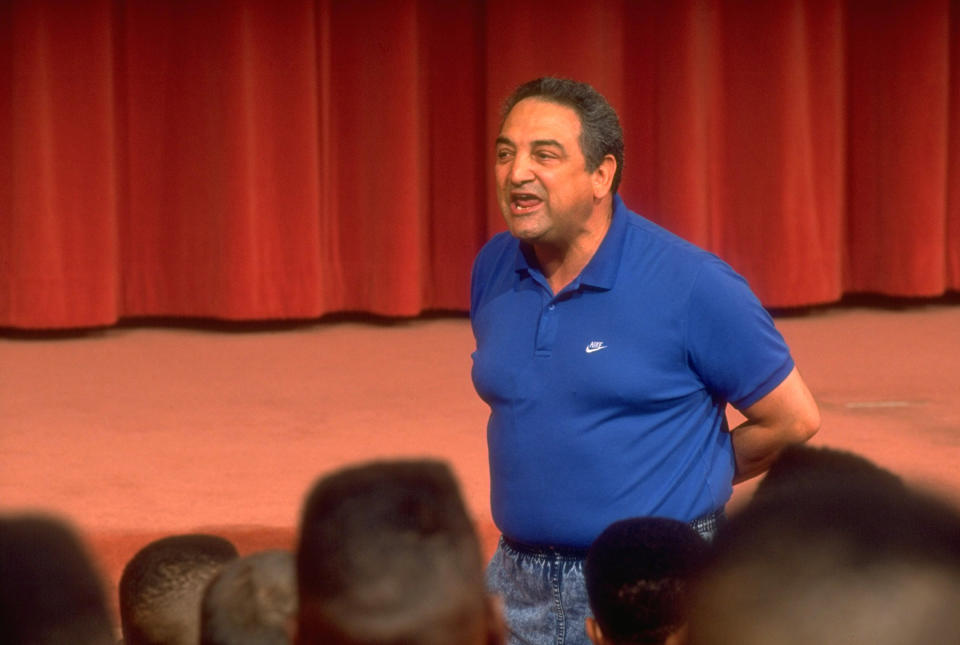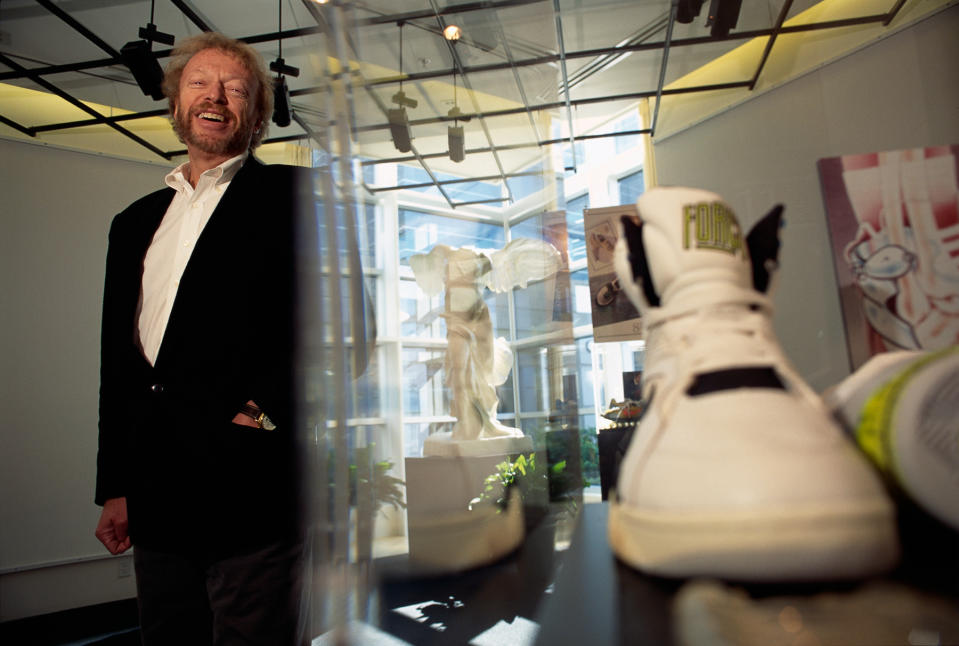What Ben Affleck’s ‘Air’ Gets Wrong about Nike and Michael Jordan
- Oops!Something went wrong.Please try again later.
- Oops!Something went wrong.Please try again later.
- Oops!Something went wrong.Please try again later.
- Oops!Something went wrong.Please try again later.

There is much to recommend in Air, director Ben Affleck’s new movie about Nike going out on a limb to sign Michael Jordan to a sneaker contract. The acting is, across the board, top-notch. Viola Davis, the finest working actor in America, turns in another heater as Jordan’s shrewd, iron-fisted mother, Deloris. Affleck himself, having finally aged into his calling as an on-screen architect of ridiculous, faintly sleazy men, is in fine form as Nike founder and CEO Phil Knight. The direction does a good job capturing the milieu of the pre-Portlandia Portland metropolitan area: gray and overcast, ranch-style domiciles everywhere, trees and Suburbans and little jogging paths scattered left and right.
The script, one of those Hollywood Black List joints, is propulsive, catchy, a little mawkish, the kind of thing that used to be in “movies for adults” all the time, and has been sidelined by prestige TV and home-run-swinging blockbuster bullshit. The movie’s last twenty or so minutes attempt a fascinating gambit that I did not expect, with mixed success: to rope Jordan’s sneaker coup in with the broader American struggle for some light concessions from the vicious billionaire class that lords over us. The gesture doesn’t WORK work, but it hums an interesting little tune.
More from Rolling Stone
'Air': Viola Davis Is the MVP of Ben Affleck and Matt Damon's Air Jordan Tale
Ben Affleck Accidentally Reignites Matt Damon's Feud With Jimmy Kimmel
Ben Affleck's 'Air' Rocks SXSW, Receives Long Standing Ovation
But for someone who came into the movie having written about Nike’s pursuit of Jordan, and their other, less savory basketball maneuvering that preceded it, it was hard to take it all in at face value. Because while the movie wields the broad outline of the story, it gets a lot wrong and leaves a lot sitting on the side of the road, in ways that I found irksome.
First and foremost: the version of Sonny Vaccaro that the movie pushes is balderdash. Matt Damon, who also produced the movie with Affleck for their new motion picture production and distribution company, is a fine actor whose light touch has brought a lot to many wonderful movies. But he is wildly miscast as Sonny, who is, full stop, the single most important person in the history of sports marketing.

Sonny Vaccarro was the son of a Pennsylvania coal miner and a small-time basketball coach. In the ‘70s, he founded the The Dapper Dan Roundball Classic, the first national game for the best high school basketball players in the country. Through this pursuit, Vaccaro, a charmer and a hustler, made relationships with college coaches across the country, who would attend the Dapper Dan to scout and recruit the country’s best talent.
Unfortunately for Sonny, there was only so much money to be made from high school all-star game coordination. So, he made a prototype for a basketball sandal and pitched it around to sneaker companies, including Nike. At the time, Nike was a successful boutique running brand. Phil Knight, an accountant with an itch for success, was a college runner, and Bill Bowerman, the company’s other founder (he actually designed the shoes), was his track and field coach at Oregon. Knight started out importing specialized running sneakers designed in Japan, but with the help of Steve Prefontaine, Nike’s first signature athlete, and the emerging wave of American fitness culture, they made a sturdy business in the running-shoe arena.
But, as you might have heard, capital is always looking to grow itself. Basketball, popular sport, big market, room for growth. Now, Rob Strasser, Nike’s director of marketing at the time, looked at the basketball sandal and said: no, absolutely not. But he also looked at Vaccaro and was intrigued. Who was this guy who somehow knew every college coach in the country? Could he help with our market-share problem? So, he picked Sonny’s mind, and Sonny pitched a wild idea that ended up transforming the entire industry.
The pros, he said, were inaccessible to Nike’s relatively slim marketing pocketbook. But colleges, and college coaches, were well within reach. Before this moment, shoe companies saw colleges as customers, not business partners. Once, shoe companies sold college programs shoes for money. Vaccaro suggested that they cast those meager profits aside and reforge college players into billboards. It was against NCAA rules to pay students to wear your shoes, but there were no rules against paying coaches, providing a bunch of sneakers for free, and having them encourage their players to wear the free kicks on national television, where a nation full of eyeballs would see them.
Air mentions this idea of Sonny’s in passing, dismissively, when Knight chastises Vaccaro for these giveaways hitting their bottom line, and Sonny replies with, “Hey, that’s a good idea!” This is the understatement of the century, like saying it was a “good idea” when the ancient primordial ooze formed into the proteins that would become life on Earth.
This strategy changed everything: the sneaker business, college recruiting, college sports, amateur and academic youth teams alike, you name it. Sonny’s camps and all-star games became Nike-only affairs, and coaches who wanted a piece of the recruiting action were forced to deal with the swoosh. Soon, every school had a sneaker partner, every coach lined their pockets with sneaker lucre, and every elite player was indoctrinated into the church of whatever brand made the biggest impression on them as a child, and the whole academic basketball complex was reforged into an arm of the apparel industry. The same model would bleed down to high school ball, traveling team ball, AAU, camps, everything. Nothing happens in basketball that isn’t touched, in some way, by a shoe company, and Vaccaro is as responsible for that development as any single individual in history. Before Vaccaro even met Michael Jordan, he was the sneaker industry’s Oppenheimer, a charming guy who uncorked the genie that messed up everything forever.
You gotta understand: by the early aughts, Robert Lipsyte was writing about Sonny in the Times like he was some kind of demon. In everything you read or watch about Sonny, people say that when they met him for the first time they speculated that he was in the mafia. Before they hired him, some Nike executives tried to get Strasser to run a background check on him, to make sure they weren’t getting involved with anyone too unsavory. (Strasser rebuffed this idea.) This was a small motormouth Italian man with a slight paunch, charming to his core, decked out with rings, and sporting an unruly mop of kinky hair. He was on that grind, 24/7, a friend to coaches, an information broker, a gossip, and a great basketball mind. Air opts to tell you about that last thing, pushing everything else aside.

In 2002, when Michael Lewis’s Moneyball was published, and again in 2011, when the movie came out, the sports executive was recast in popular culture. Once, he was a grimy man in obscure gyms, sitting at the axis of money and coaching, trading stories and sitting their feet on bar counters. But Moneyball’s guys were more sedate, rational. Guys who watched games and dredged information out of them with savant-like precision.
Neither depiction is correct in the aggregate. Every guy who succeeds in the talent-hunting field strikes a balance in their own way. But Vaccaro, if we’re all being honest, was far more the first than the second, and Air opts to instead play him as the second. Here’s Sonny, alone, consuming tape. Here’s Sonny, a sensitive basketball genius, not getting along with his aggro co-workers. Here’s Sonny getting a fat haul in Vegas with his basketball-attuned third eye. It is true that he saw further into the future on Jordan than most people, but that wasn’t why he was at Nike. He was at Nike because he was a maven and Air is just totally unconcerned with that truth. Compound that with Damon, sporting his extremely smooth, blond hair and his naturalistic affect, and the telling is just all off. The only thing they really get right is the paunch: Damon brings the thunder to Sonny’s gut. But aside from that, the role, the character, the story demand a different approach entirely: Mark Ruffalo with a perm, maybe, or a de-aged Stanley Tucci wearing a wig. Hell, hard to see Affleck on the screen and not wonder if maybe he would be a better fit in the role.
The movie takes some other, more benign cinematic liberties. No, Sonny did not go to Michael Jordan’s house. No, MJ’s mom did not suggest that Michael get a percentage of the profits, but she was instrumental in pushing Michael to pick Nike’s offer over other, more prestigious sneaker deals. MJ’s meetings with Converse and Adidas didn’t go down like that. Actually, he didn’t even meet with Adidas, even though they made his preferred basketball shoe. Jordan wasn’t actually the first athlete to get a piece of his merchandise pie: tennis players were on that for a while before MJ stepped into Nike. He was the first basketball player to get the deal, though.
The biggest liberty the movie takes is in its depiction of Jordan’s agent, David Falk. The movie casts Falk as a minor antagonist, a bulldog who was trying to keep MJ away from rinky-dink lil’ Nike. Horseshit. Falk had a vision for Jordan as a cross-platform spokesperson, and wanted a sneaker partner who was willing to invest in a marketing approach that would put MJ forward as a commodity of his own. He was a big hand on the wheel that steered Michael to Nike. The movie’s approach to Falk reeks of Robert McKee story-structure bullshit that does the person and the character a major disservice.
Please. Phil Knight wrote ‘Shoe Dog,’ his autobiography and the story of Nike. He had one page, ONE PAGE, where he mentions Sonny. It’s about time we got Sonny’s version. Nike wouldn’t be where they are without Sonny Vaccaro. https://t.co/ZQXueDqO6J
— Chris Andrews (@andrewssports) February 11, 2023
But the movie does strike one truth that you can’t expect going in. It depicts Phil Knight, the founder of Nike, a guy who reaped the biggest harvest behind all this basketball shoe stuff, as only tangentially involved with the process of signing and marketing Jordan. Vaccaro made the social inroads and created the economic terrain, Rob Strasser trusted Sonny and led the marketing bonanza that turned MJ into basketball Mickey Mouse, and Peter Moore, Nike’s in-house designer, actually made the Air Jordan I, the shoe that birthed an entire industry.
Their reward for all this? Well, Vaccaro was fired by Knight in 1991. He was replaced by George Raveling, the best man at Vaccaro’s wedding, who also talked crap about Sonny in the press for doing the same stuff that Nike Hired George to do, an attempt by Knight and the company to distance themselves from the unseemly milieu that made Knight a goddamn billionaire. He and Strasser and Moore all went to Adidas, where they forged that company’s floundering basketball program into Nike’s biggest competitor. All three go unmentioned in Phil Knight’s basketball Hall of Fame induction speech.
All for a little Hollywood shine, but if this movie is all Sonny Vaccaro’s version of events — and seems to be that way given that none of the greatest Nike historians have been talked to — this thing is going to be far from the actual story pic.twitter.com/qWkvLjSeI9
— Darren Rovell (@darrenrovell) February 10, 2023
A sports-business bootlicker like Darren Rovell could never acquiesce himself to the truth, written over and over in every history of Nike you can get your hands on: Sonny made this market, pursued its biggest star, and was not entitled to the windfall of his own work the way Phil, a jogger who was only cursorily interested in basketball, was. Air’s final act features a scene where MJ’s mom talks to Sonny, insisting on Jordan getting a cut of the profits from his shoe, and says that people like her, working people, and her son, a working person of a different sort, deserve a piece of what they make for rich men, and that she intends to take it for Michael.
This scene is fiction, of course, but it’s also the best thing in the movie — the key moment when it extends its reach as a breezy underdog business pic and tries to be something else, a story about the unsung, underpaid grinders who actually made the business that their boss reaped the rewards of. It’s not that Knight didn’t have a vision: it was just a vision of globalization, the same one every rich man was having at the time, a glint in his eye that saw factories and sweatshops all over the world pumping out Nike shit, not of a world where Michael Jordan sold all of that for him, just by being himself. Maybe the sequel to Air can deal with those people who Nike ignores in their self-conception. Would be a shame to top out at Sonny.
Best of Rolling Stone

